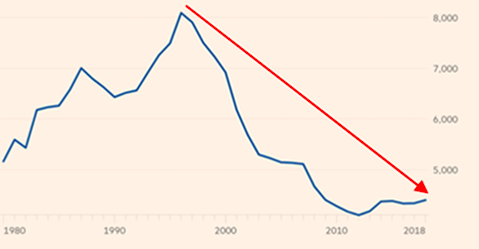One of the first cases of study looking at using Blockchain Technology in the insurance sector was by AXA, which launched fizzy, (automating insurance claims for delayed flights). Fizzy recorded clients’ flights and then monitored the flight they had taken. It was then ascertained if there had been any delay by using global air traffic databases to monitor flight statuses. Subsequently, should a policyholder experience a flight delay of two or more hours, a then Smart Contract automatically makes a compensation payment to the policyholder. This removes the need for paperwork, so avoiding ‘hassle’ for both the policyholder and AXA alike.
We have seen how Blockchain Technology in other industries is fostering ‘collaborative capitalism’ (where companies are usually competing against each other and working together using Blockchain Technology) and so it is interesting that this is also now evident in the insurance sector. As KPMG reported “an excellent collaborative blockchain use is the fraud detection and prevention. Criminal activity often exploits insurers’ ‘blind spots’, where fraudulent patterns can only be detected across a wide data set, often across multiple insurers. Legal and competitive challenges have hampered insurers’ attempts to share intelligence on fraudulent activity to date. However, the development of a blockchain network could provide a way for competitors to safely and securely share data, gain visibility into criminal patterns, and prevent future losses”.
To further support this, Allianz recently told Forbes “Allianz is further exploring Blockchain Technology to simplify and accelerate cross-border insurance payments for its corporate customers. A project team is in advanced stages of the development for a token-based electronic payment system to allow for frictionless, transparent and instantaneous money transfers for a range of different types (of) payments.”
Blockchain Technology has the potential to automate and share in a highly secure manner the currently paper-based manual process such as policyholder identity, verification, contract validity checking, claims payments, etc, those reducing the administrative burden for brokers and insurance companies alike. Another exciting possibility for Blockchain is, therefore, its potential to assist in the creation of an incorruptible, international and cross-industry database which could be used to flag up possible signs of insurance fraud.
This database could also be used to check information such as claims history and police reports, alongside a range of other information required by brokers and insurers when dealing with contracts and claims. These contracts and claims could then be recorded on the Blockchain, ensuring that only valid claims are accepted. One of the key advantages that supporters of Blockchain Technology highlight are that it uses cryptographic security and because data is not just held in one place it makes it harder to hack and alter stored records.
Once again we are seeing signs of ‘collaborative capitalism’ in action as several companies in the insurance sector have joined the B3i initiative. PwC has found, “there are benefits to be gained by insurers by pooling data to facilitate reinsurance processes”.
It is likely we will see the insurance industry increasingly using Blockchain Technology and also continue to offer new types of cover for...
One of the first cases of study looking at using Blockchain Technology in the insurance sector was by AXA, which launched fizzy, (automating insurance claims for delayed flights). Fizzy recorded clients’ flights and then monitored the flight they had taken. It was then ascertained if there had been any delay by using global air traffic databases to monitor flight statuses. Subsequently, should a policyholder experience a flight delay of two or more hours, a then Smart Contract automatically makes a compensation payment to the policyholder. This removes the need for paperwork, so avoiding ‘hassle’ for both the policyholder and AXA alike.
We have seen how Blockchain Technology in other industries is fostering ‘collaborative capitalism’ (where companies are usually competing against each other and working together using Blockchain Technology) and so it is interesting that this is also now evident in the insurance sector. As KPMG reported “an excellent collaborative blockchain use is the fraud detection and prevention. Criminal activity often exploits insurers’ ‘blind spots’, where fraudulent patterns can only be detected across a wide data set, often across multiple insurers. Legal and competitive challenges have hampered insurers’ attempts to share intelligence on fraudulent activity to date. However, the development of a blockchain network could provide a way for competitors to safely and securely share data, gain visibility into criminal patterns, and prevent future losses”.
To further support this, Allianz recently told Forbes “Allianz is further exploring Blockchain Technology to simplify and accelerate cross-border insurance payments for its corporate customers. A project team is in advanced stages of the development for a token-based electronic payment system to allow for frictionless, transparent and instantaneous money transfers for a range of different types (of) payments.”
Blockchain Technology has the potential to automate and share in a highly secure manner the currently paper-based manual process such as policyholder identity, verification, contract validity checking, claims payments, etc, those reducing the administrative burden for brokers and insurance companies alike. Another exciting possibility for Blockchain is, therefore, its potential to assist in the creation of an incorruptible, international and cross-industry database which could be used to flag up possible signs of insurance fraud.
This database could also be used to check information such as claims history and police reports, alongside a range of other information required by brokers and insurers when dealing with contracts and claims. These contracts and claims could then be recorded on the Blockchain, ensuring that only valid claims are accepted. One of the key advantages that supporters of Blockchain Technology highlight are that it uses cryptographic security and because data is not just held in one place it makes it harder to hack and alter stored records.
Once again we are seeing signs of ‘collaborative capitalism’ in action as several companies in the insurance sector have joined the B3i initiative. PwC has found, “there are benefits to be gained by insurers by pooling data to facilitate reinsurance processes”.
It is likely we will see the insurance industry increasingly using Blockchain Technology and also continue to offer new types of cover for Digital Assets and its participants.
 Thus, as to the benefits of using Blockchain, the jury would appear to be still out.
Thus, as to the benefits of using Blockchain, the jury would appear to be still out.



